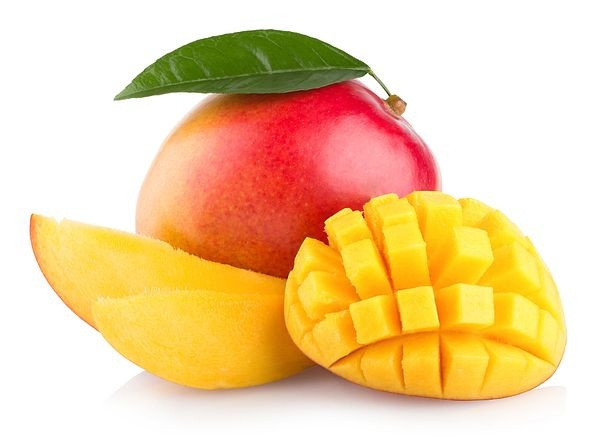Unexpected benefits when you eat mango every day
"King of fruits", "nutritional hero" is what many experts call mango. This is a very popular, nutritious fruit and is widely consumed around the world.
Nutritionist Sarah Rivenburgh (USA) said that many fruits contain fiber, but mangoes are special because they contain soluble fiber. Soluble fiber is especially good for health because it forms a gel in our digestive tract.
“It can bind to fat and cholesterol and pull it out of your body before it is absorbed into the bloodstream,” Rivenburgh tellsTODAY.com.
Nutritionist Samantha Cassetty included mangoes in her list of 15 healthiest fruits because of their carotenoid compounds, which give mangoes their yellow color and health benefits.

Mango is one of the healthiest fruits Photo: Gettyimages
Nutritional value of mango
According to the US Department of Agriculture, one cup of sliced mango provides 99 calories, 1.3 grams of protein, 25 grams of carbohydrates, 2.6 grams of fiber, and 22 grams of sugar. This fruit has no cholesterol and almost no fat. It contains calcium, iron, copper, magnesium, potassium, folate, and lycopene.
One cup of mango provides 67% of the recommended daily value of vitamin C. The body cannot make this essential nutrient and antioxidant, but it is important for the production of collagen, a key component of healthy skin.
Additionally, mangoes are a source of immune-boosting nutrients. 165 grams of mango provides 10% of your daily vitamin A needs.
Additionally, the same amount of mango provides nearly three-quarters of your daily vitamin C needs. This vitamin can help your body produce more disease-fighting white blood cells, help them function more effectively, and improve your skin's defenses.
Mangoes also contain folate, vitamin K, vitamin E and several B vitamins, which help support immunity.
What are the benefits of eating mango?
Rivenburgh notes that in addition to helping lower cholesterol levels, mangoes' soluble fiber is good for gut health and regular bowel movements, and may have anti-diabetic effects.
"It helps move waste through your system and it can help with constipation. Whenever you consume foods that are higher in fiber, it means your body digests them a little bit slower and therefore you may not see a spike in your blood sugar," she adds.
Fiber can also help people feel fuller for longer, which can prevent overeating and help with weight loss. This will help you maintain a healthy weight, which can reduce your risk of diabetes, cancer, and heart disease, Rivenburgh adds.
A 2020 research review found that women who eat a diet rich in fiber may have a lower risk of breast cancer.
Mangoes are a rich source of carotenoids, the pigments that give fruits and vegetables their red, yellow, or orange color and act as antioxidants. A study published in the American Journal of Clinical Nutrition found that women who ate a diet rich in carotenoid-rich fruits and vegetables had a reduced risk of breast cancer.
Cassetty notes that two carotenoids in mangoes — lutein and zeaxanthin — also promote better vision.
The fruit is also rich in polyphenols, powerful antioxidants found in plants, and one of them, mangiferin, is found only in mangoes, Rivenburgh adds. Of the polyphenols, mangiferin has received the most attention and is sometimes called a “super antioxidant” because it is particularly powerful.
Test-tube and animal studies have found that mangiferin may fight free radical damage linked to cancer, diabetes and other diseases.
Antioxidants help neutralize damage caused by free radicals. This damage can lead to inflammation and may increase the risk of cancer and other diseases, but antioxidants can protect cells from it, the National Cancer Institute notes.
Rivenburgh notes that mangiferin has anti-cancer benefits, but there isn't enough human research to say for sure.
Mangoes are also a good source of potassium. Too much sodium and not enough potassium is the cause of high blood pressure in many people. If we can reduce sodium in our diet and eat more potassium-rich foods like mangoes, it can help lower blood pressure.
The American Heart Association says the potassium, fiber and other nutrients found in mangoes help reduce the risk of heart disease, calling the fruit a "nutritional hero."
Notes when using mango
According to Medlatec General Hospital, when you eat too much mango, your body may experience some digestive problems, such as bloating, nausea, diarrhea... due to the high amount of carbohydrates in mango, which can ferment, causing harm to digestion.
For people with diabetes, although mango is a fruit rich in fiber, causing blood sugar to increase slowly, if eaten too much, it can still cause this index to increase. Not to mention that when peeling, the amount of fiber in mango will decrease. Therefore, people with diabetes should eat an appropriate amount as recommended.
People who are overweight or obese should only eat a moderate amount. Mangoes are also not good for people with kidney inflammation./.
